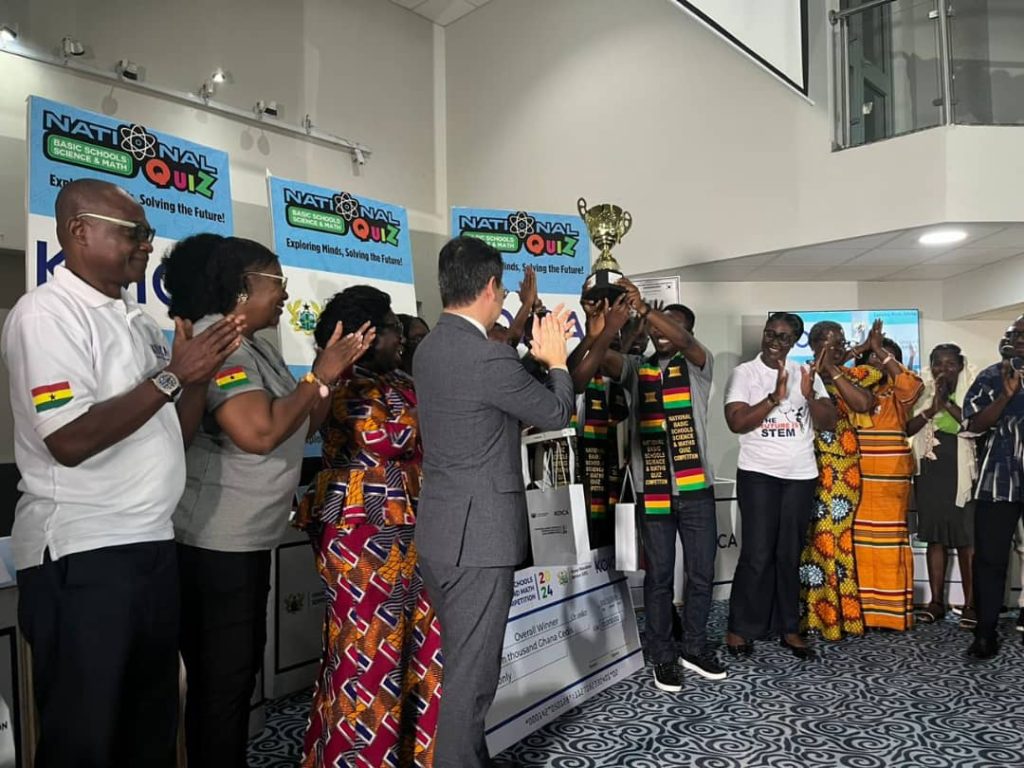By Priscilla Oye Ofori
Accra, Oct. 06, GNA – The Eastern Region has emerged as the winner of the inaugural National Basic Schools Science and Mathematics Quiz.
The competition was organized by the Ghana Education Service (GES) in collaboration with the Korea International Cooperation Agency (KOICA).
The Region clinched the overall top spot with 88 points, defeating the Central, Northern, and Savannah Regions.
As the champions, the Eastern Region received a trophy, a plaque, and scholarships worth GH₵ 10,000 for each contestant, along with GH₵ 2,500 each for their teachers and coordinators.
The Central Region, which placed first runner-up with 75 points, won a trophy, plaque, scholarships of GH₵ 8,000 for each contestant, and GH₵ 1,500 for each teacher/coordinator.
The Northern Region, securing second runner-up with 73 points, was awarded a trophy, plaque, GH₵ 5,000 scholarships for each contestant, and GH₵ 1,000 for their teachers and coordinators.
The Savannah Region, which scored 45 points, also received trophies, plaques, medals, certificates, tablets, and other souvenirs, alongside the prizes awarded to contestants in the top three regions.
The competition involved a regional and zonal quiz system leading up to the grand finale.
In addition to the students, selected District Directors, Head Teachers, Mathematics, Science, Gender teachers, and Circuit Supervisors (CISO) were honored with Excellence Awards for their outstanding contributions to the education sector.
Mr. Kyongsig Park, the Korean Ambassador to Ghana, expressed strong support for Ghana’s growing emphasis on Science, Technology, Engineering, and Mathematics (STEM) education, highlighting its alignment with Korea’s vision of fostering inclusive development through quality education.
“By prioritising the right to education, we strive to strengthen educational systems in partnership with countries like Ghana. Together, we are building a future where Ghana is poised to lead STEM education in Africa, laying a foundation for sustainable growth and empowerment,” Ambassador Kyongsig stated.
He commended Ghana’s ongoing efforts to foster STEM education, noting that Korea’s own transformation from a country once dependent on aid to a global leader in innovation demonstrated the transformative power of quality STEM education.
“We are particularly proud of the Girls STEM initiative by KOICA, which underscores our commitment to inclusive education,” Mr. Kyongsig added.

Mr. Dong Hyun Lee, the Country Director of the Korea International Cooperation Agency (KOICA) in Ghana, stressed the organization’s aim to enhance STEM education at the basic school level, an area he noted had received limited funding compared to higher education.
“The high school level already receives significant funding, but there is a gap at the middle school level for STEM education. We are working to strengthen this sector,” he explained.
Mr. Lee underscored the importance of prioritizing education for children and youth, considering it a critical factor in a country’s development and success.
Mrs. Olivia Serwaa Opare, Director of the Science Education Unit of the Ghana Education Service (GES), reflected on the progress in STEM education and expressed joy over the performances of students in related contests.
“I am happy, especially with the hands-on, minds-on, and heart-on activities. Our learners were able to come up with their findings from experiments, showing that the standard-based curriculum is being effectively applied,” she said.
She acknowledged, however, that there was still room for improvement and assured that efforts would be made to close existing gaps by increasing practical work in the classroom for all topics.
GNA